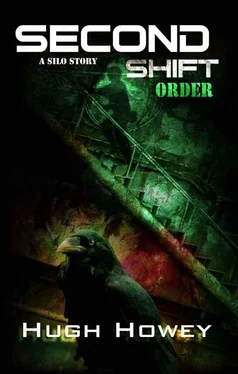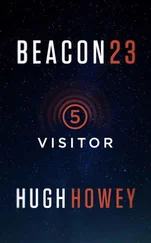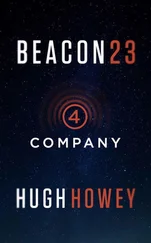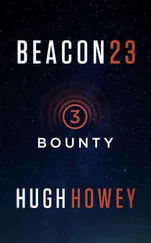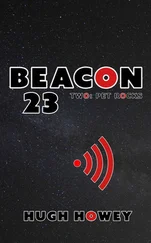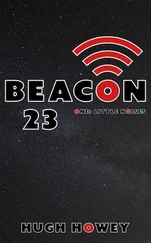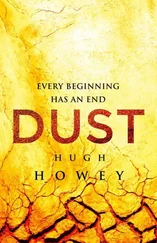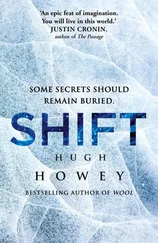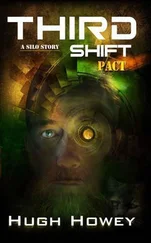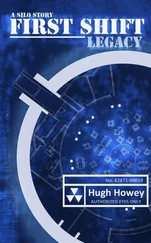“Say I wanted to move something without going through Dispatch.” Mr. Wyck smiled. “And say I wanted to avoid the sort of nastiness that took place last night a few levels up from here.”
Mission glanced over at Jeffery, who seemed disinterested in the conversation. It was strange to hear this sort of offer from a man of authority in front of a member of Security, but there was one thing Mission had discovered since he emerged from his shadowing days: things only got darker.
“I don’t follow,” Mission said. He fought the urge to turn and see how far they were from the security gate. A woman emerged from an office down the hall, behind Mr. Wyck. Jeffery made a gesture with his hand, and she stopped and kept her distance, out of earshot.
“I think you do, and I admire your discretion,” Mr. Wyck said. “Two hundred chits to move a package a half dozen levels from Supply.”
Mission tried to remain calm. Two hundred chits. A month’s pay for half a day’s work. But he feared this was some sort of test. Maybe Rodny had gotten in trouble for flunking a similar one.
“I don’t know—” he said.
“It’s an open invite,” Wyck said. “The next porter that comes through will get the same offer. I don’t care who does it, but the first will get the chits. You don’t have to answer me. Just show up and ask for Joyce at the Supply counter. Tell her you’re doing a job for Wyck. There’ll be a delivery report detailing the rest.”
“I’ll think about it, sir.”
“Good.” Mr. Wyck smiled.
“Anything else?”
“No, no. You’re free to go.” He nodded to Jeffery, who snapped back from wherever he’d checked out to.
“Thank you, sir.” Mission turned and followed the chief.
“Oh, and happy birthday, son,” Mr. Wyck called out.
Mission glanced back, didn’t say thanks, just hurried after Jeffery and through the security gate, past the crowds and out on the landing, down two turns of stairs, where he finally reached into his pocket for the note from Rodny. Paranoid he might drop it and watch it bounce off the stairs and through the rail, he gingerly and methodically unfolded the scrap of paper. It looked like the same rag blend Mrs. Crowe’s note had been written on, the same threads of purple and red mixed in with the rough gray weave. For a moment, Mission feared the note would be addressed to the Crow rather than to him, maybe more lines in old nursery rhymes. He worked the piece of paper flat, one side blank, turned it over to read the other.
It wasn’t addressed to anyone. Just two words, and Mission remembered the way his friend’s smile had quivered while they shook hands.
Mission felt suddenly alone. There was the smell of something burning lingering in the stairwell, a tinge of smoke that mixed with the paint from drying graffiti. He took the small note and tore it into ever smaller pieces. He kept tearing until there was nothing left to pinch with his fingers, nothing left to shred. He waited until a passing man spiraled out of sight and then sprinkled the dull confetti over the rail to drift down and disappear into the void.
The evidence was gone, but the message lingered vividly in his mind. The hasty scrawl, the shadowy scratch the edge of a coin or a spoon made as it was dragged across paper, two words barely legible from his friend who never needed anybody or asked for anything:
Help me.
And that was all.
Time is too slow for those who wait, too swift for those who fear, too long for those who grieve, too short for those who rejoice, but for those who love, time is eternity.
— Henry Van Dyke
Finding the right silo was easy enough. Donald could look at the old schematic and remember standing on those hills, peering down into the wide bowls that held each facility. The sound of grumbling four-wheelers came back, the plumes of dust kicked up as they bounced across the ridges where the grass had not yet filled in. He remembered that they had been growing grass over those hills, straw and seed spread everywhere, a bit of an illusion, a task hindsight made both pointless and sad.
Standing on that ridge in his memory, he was able to picture the Tennessee delegation. It would be Silo 2. Once he had this, he dug deeper. It took a bit of fumbling to remember how the computer program worked, how to sift through lives that lived in databases. There was an entire history there of each silo if you knew how to read it, all those souls trapped in little cells, but the history only went so far. It went back to made-up names, back to the orientation. It didn’t stretch to the Legacy beyond. The old world was hidden behind bombs and a fog of mist and forgetting.
He had the right silo, but locating Helen might prove impossible. He worked frantically while Anna sang in the shower.
She had left the bathroom door open, steam and her melodic humming both billowing out. Donald ignored what he took to be an invitation. He ignored the throbbing, the yearning, the hormonal rush of being near an ex-lover after centuries of need. He searched instead for his wife.
There were four thousand names in that first generation of Silo 2. Four thousand, exactly. Roughly half were female. There were three Helens. Each had a grainy picture taken for her work ID stored on the servers. None of the Helens matched what he remembered his wife looking like, what he thought she looked like. Tears came unbidden. He wiped them away, furious at himself. From the shower, Anna sang a sad lament from long ago while Donald flipped through random photos. After a dozen, the faces of strangers began to meld together and threaten to erode the Helen in his memory. He went back to searching by name. Surely he could guess the name she would’ve chosen. He had picked Troy for himself those many years ago, a clue leading him back to her. He liked to think she would’ve done the same.
He tried Sandra, her mother’s name, but neither of the two hits were right. He tried Danielle, her sister’s name. One hit. Not her.
She wouldn’t come up with something random, would she? They had talked once of what they might name their kids. It was gods and goddesses, a joke at first, but Helen had fallen in love with the name Athena. He did a search. Zero hits in that first generation.
The pipes squealed as Anna turned off the shower. Her singing subsided back into a hum, a song of sadness and grief, a hymn for the funeral they were about to attend. Donald tried a few more names, anxious to discover something, anything. He would search every night while the silo slept if he had to. He would search while he pretended to work on this problem with the silos. He wouldn’t sleep until he knew, until he found her.
“Do you need to shower before the service?” Anna called out from the bathroom.
He didn’t want to go to the service, he nearly said. He knew Victor as someone to fear, a boss sitting across the hallway, always watching, dispensing drugs, manipulating him. At least, that’s how the paranoia of those days made it all seem.
“I’ll go like this,” he said. He still wore the beige coveralls they’d given him the day before. He flipped through random pictures again, starting at the top of the alphabet. What other name? The fear was that he’d forget what she looked like. Or that she’d look more and more like Anna in his mind. He couldn’t let that happen.
“Find anything?”
She snuck up behind him and reached for something on the desk. A towel was wrapped around her breasts and reached the middle of her thighs. Her skin was wet. She grabbed a hairbrush and walked, humming, back to the bathroom. Donald forgot to answer. His body responded to Anna in a way that made him furious and full of guilt. The monitor fogged from the steam. He felt clammy from something else.
Читать дальше
